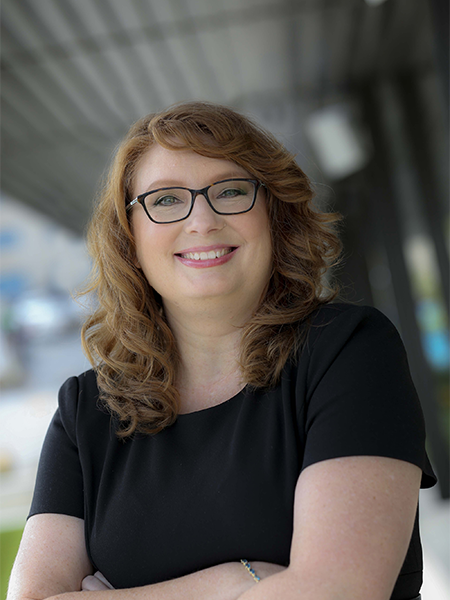‘How do we make it better for others?’ This HSC professor is helping guide a new generation of researchers
By Diane Smith-Pinckney
Dr. Rebecca Cunningham sounds like a proud mother when she talks about her students at HSC.
Some are first-generation students who graduated with Masters and PhD degrees from her lab. Her first PhD student now oversees clinical research and is testing different therapeutics in southern states while her first Master’s student is a high school teacher trying to inspire a new generation of scientists.
“When you take someone under your wings to train them, you are giving a little bit of yourself to them,” she said. “You are their mentor and you are invested in them for their entire career. I’m here for them today, tomorrow and always.”
Dr. Cunningham is Associate Dean for Research and Associate Professor of Pharmaceutical Sciences in the College of Pharmacy. She is continually encouraging her students, “It’s OK to mess up,” she said. “We know it’s s a journey and there are going to be bumps. It’s always about getting back up on your feet.”
Dr. Cunningham has been at HSC for 12 years and considers those on campus her “HSC Family.” Her network includes faculty within the College of Pharmacy and across different schools, including the School of Biomedical Sciences and Texas College of Osteopathic Medicine (TCOM) allowing her work to be more translational and cover multiple areas.
Dr. Cunningham, a first-generation college student, reaches out to help students forge their academic paths. She knows from her own experience that guidance from educators can be an immense help for first-generation students who are trying to figure out their options.
“As a first-generation student, you don’t have all the information,” Dr. Cunningham said. “You are looking for it and your network is not large enough to be able to find what you need and you’re unsure of where to go for it.”
As an undergraduate student, Dr. Cunningham was advised to work in an emergency room and a research lab the A.T. Still University (ATSU) of Health Sciences, located in the small town of Kirksville, Mo.
“By working at both of those facilities, I was able to fine tune where I was going to go and it opened up more opportunities for my future,” she said.
Dr. Cunningham enjoys working at a health science center that includes an osteopathic medical school and College of Pharmacy.
“It really is centered on patient care and how we can – through different avenues – try to improve the health and wellbeing of others,” she said.
Dr. Cunningham’s lab conducts research centered on how hormones such as androgens and estrogens drive sex differences between Alzheimer’s and Parkinson’s diseases.
“The goal is, by working with others who do drug discovery, to see if we can find therapeutic targets that may be more in line with personalized medicine,” she said.
Dr. Cunningham also runs a non-profit in her spare time. She created the Low Iodine Diet (LID) Community, a 501c3 non-profit after battling thyroid cancer. Volunteers with the non-profit offer support via Facebook and a website.
The non-profit was created in response to the need for cancer patients to follow a low-iodine diet before radiation treatments.
“There are more than 13,000 people who have been helped by our group,” she said. “We have volunteers across the world, including the United States, Canada, Australia and the United Kingdom, who offer free assistance to those who need it.”
“We help them through their treatments,” she said. “I see us as a place where patients can go and they can talk to somebody who has been on the same path as them.”
Dr. Cunningham’s work, relationships with students and her non-profit are examples of how she uses her experiences to lessen the struggles of others.
A valued member of the HSC Team, Dr. Cunningham is committed to giving back to the community by sharing her knowledge, expertise and life lessons from her own journey to make the world a better place.




![Uyen Sa Nguyen Scaled[58]](https://www.unthsc.edu/newsroom/wp-content/uploads/sites/16/Uyen-Sa-Nguyen-scaled58-145x175.jpg)

Social media